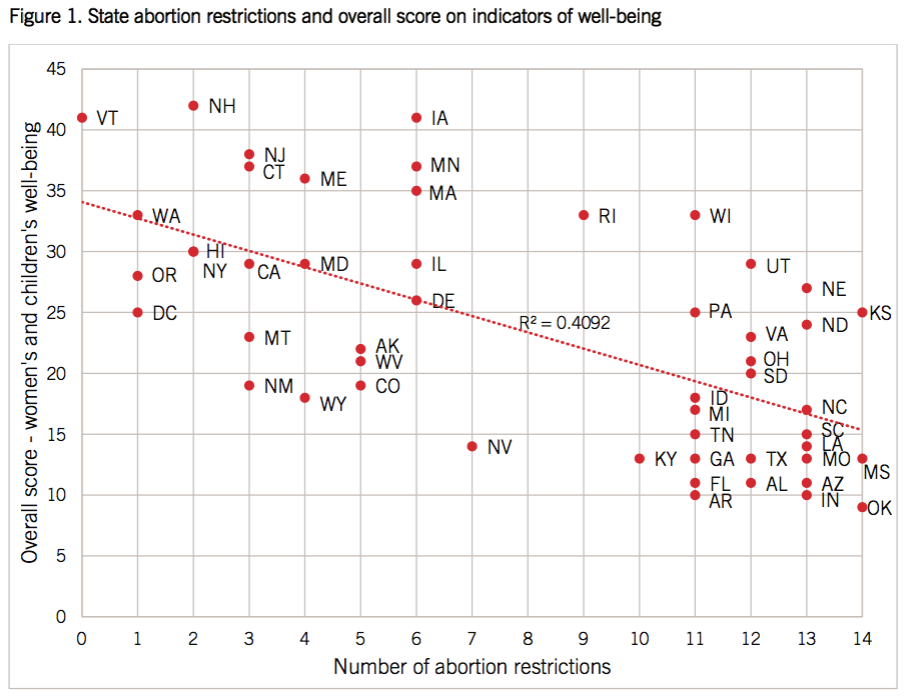Anti-abortion crusaders are more concerned about political grandstanding than women's health outcomes. The Center for Reproductive Rights finds that states where such anti-abortion sentiments prevail in policymaking tend to have worse health outcomes for women and children.
Now the study doesn't say that abortion restrictions make women sick (although they should). The study simply affirms that policymakers like Mike Rounds, Dennis Daugaard, and Larry Pressler who are willing to ignore scientific evidence that abortion bans don't reduce abortions will probably do a worse job of making evidence-based, effective public health policy.

In kinda-sorta good news, South Dakota is not the most oppressive place for women. Like Texas, we only have twelve of the fourteen restrictions on abortion considered by the researchers. Kansas, Mississippi, and Oklahoma have all fourteen; eight states have thirteen such restrictions.

In Texas,gay Perry(not the one in France) keeps abortion related monies in the family. He not only appointed his sister to be head of the Ambulatory Surgical Center board,she has a financial stake in 5 of the 6 clinics that would be open if all restrictions are put in place.
Your post looks more like Sibby bait than anything, Cory.
http://www.lcsun-news.com/las_cruces-news/ci_26460790/organization-open-clinic-providing-abortions-las-cruces
And apparently some state officials are going to try to tax mothers who breast feed since they are losing sales tax revenue from formula. It is tough being a woman in SD.
http://www.argusleader.com/story/opinion/columnists/jonathan-ellis/2014/10/04/ellis-playing-chicken-state-sales-tax/16748765/
Abortions are just not healthy at all for babies.
The christian right is fearful of white women terminating their pregnancies. Rich women have full reproductive rights while women at lower income levels do not.
A study just released by the New England Journal of Medicine suggests that free IUDs would slow the number of abortions by as much as 80%.
Back in the days it was called "D and C," only those who could afford it had it done.
Back in the old days before the Roe v. Wade decision women who decided they couldn't or shouldn't carry a pregnancy to term but could not afford illegal D & C procedures had to resort to unsafe abortions, some through self-help remedies and some through quack providers.
http://www.huffingtonpost.com/2014/04/03/back-alley-abortions_n_5065301.html
Roger E - I understand your viewpoint that all abortions are unsafe for unborn babies. I don't think that is a valid reason for forcing women to use unsafe methods to terminate pregnancies instead of providing them with safe health care. It is simply unrealistic to think that by making abortions unsafe as a matter of law that you can prevent women from trying to end a pregnancy they do not want.
". . . abortions continue to be common in many areas where they are illegal; abortion rates are similar in countries where the procedure is legal and in countries where it is not according to the World Health Organization . . . ."
http://en.wikipedia.org/wiki/Abortion_law
Since abortions will continue, whether legal or illegal, the question is whether women should have safe help in terminating pregnancies or be left to their own devices despite the dangers. I would think rational pro-life people would realize that since the laws cannot stop all abortions, nor even reduce them, the pro-life position would be to advocate for safe termination options for women.
It does seem indicate that states that with policies to restrict abortion don't care about women's and children's health. Do the restrictions cause the poorer health? It's hard to conclude causation, but you might speculate that folks who are anti-abortion don't care about the child or the women, as much as they care about an specious ideology.
I'd be interested, actually, in whether states with more anti-abortion restrictions actually have both more abortions per thousand women, more unwanted pregnancies and more deaths in childbirth. My hypothesis would be that states with more anti-abortion restrictions have worse women's and reproductive health care, which actually causes more abortion, unwanted pregnancies and deaths in childbirth.
Don beat me to it.
My observation is that states with onerous restrictions on abortion tend to have less respect for women in general, and minimal concern for the whole of women's lives.
Governments in those states are less likely to require necessary levels of care from insurance providers. Pre- and post-natal care are less available and more expensive, as are a variety of well woman preventative options.
Care for women throughout their lives is less. Mental health care is hard to find and afford.
Some of these issues also affect males to some extent.